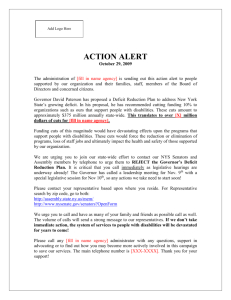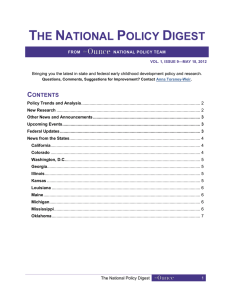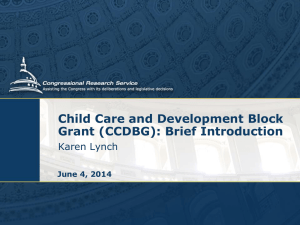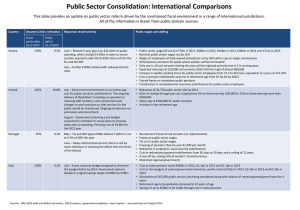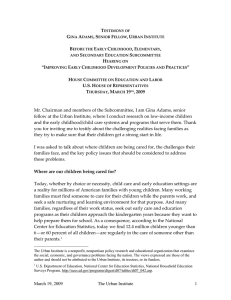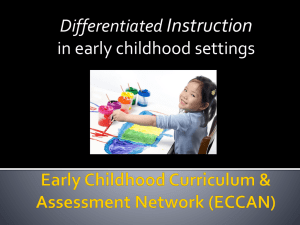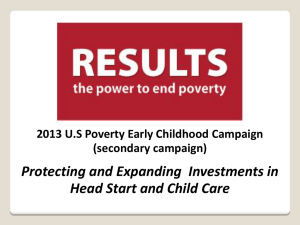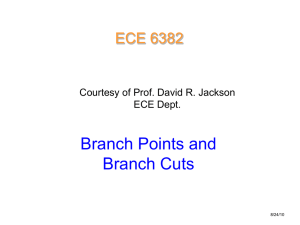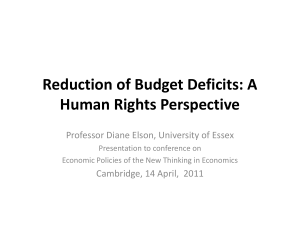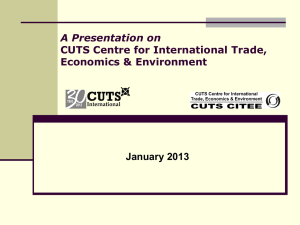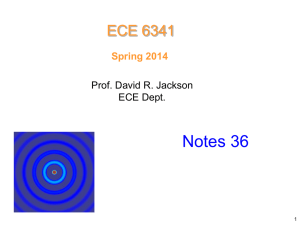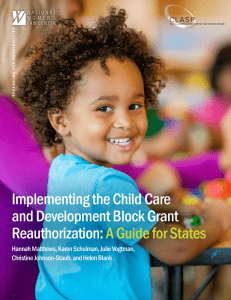Early Childhood Development PowerPoint presentation
advertisement
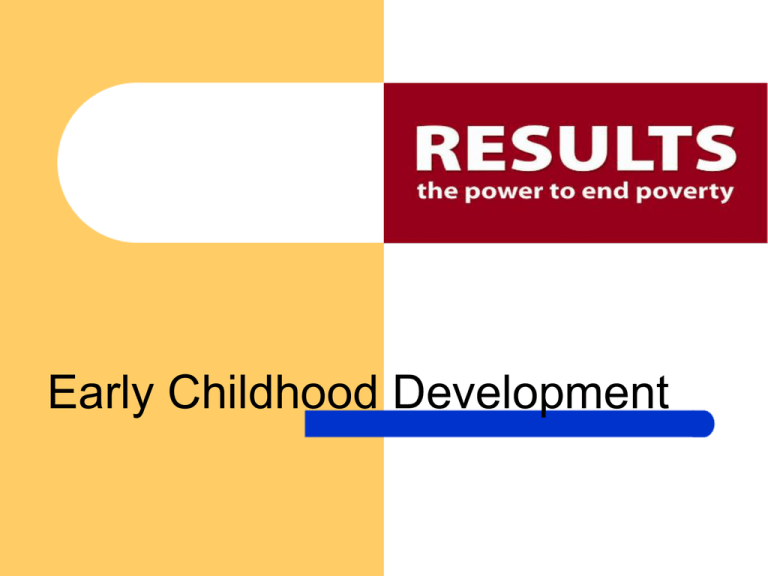
Early Childhood Development Investing In America’s Children • Investing in America’s children is an investment in America’s future • Supplying early childhood development programs can help break the cycle of poverty • Parents need access to reliable child care in order to work • We focus our efforts on quality early education and child care Early Childhood Development Research shows that children who participated in a quality program during their preschool years are better prepared to learn, have higher self-esteem, and more developed social skills when they start kindergarten. Head Start Federally funded program, provides comprehensive child development services to disadvantaged preschool children (ages 3-6) and their families. These services include: o o o o o School readiness and cognitive development services Frequent medical screening, immunizations, and dental services Healthy nutritional assistance Referral services for a range of individual child and family needs An opportunity for parents to participate in school decisionmaking Early Head Start Federally funded program with a mission to promote healthy prenatal outcomes for pregnant women, enhance the development of children ages 3 and under, and promotes healthy family functioning. These services include: o o o o o Quality early education both in and out of the home Parenting education Comprehensive health and mental health services, including services to women before, during, and after pregnancy Nutrition education Family support services Child Care Affordable and quality child care is crucial to parent’s productivity at work and children’s intellectual development Vital for working families, especially low-income families who want to move out of poverty But, the cost of child care is often too expensive for low income and moderate-income working families Funding for the Child Care and Development Block Grant (CCDBG) comes from three sources: 1. CCDBG funding is included at a mandatory level specified in the welfare law 2. Congress annually appropriates a discretionary amount 3. States may choose to use part of their federal welfare block grant. The amount varies from year to year and has decreased dramatically because of states’ fiscal crises. Fiscal Year 2011 Funding Baseline • Head Start: FY 2011 budget included an increase of $340 million for Head Start over the FY 2010 levels, this meant that all children currently in Head Start- including those funded by ARRA will remain enrolled. [See state-level data in CLASP’s state fact sheets ]. • A $100 million increase in the Child Care and Development Block Grant (CCDBG) from FY2010. This will sustain a small number of the children served by ARRA. It includes a proportional increase over baseline (pre-ARRA) funding levels in the quality set-aside (from $271 million to $284 million) and the infant/toddler set-aside (from $99.5 million to $104 million). The bill provides $2.227 billion in total for the CCDBG. NWLC Report What Congress Must Do This Year • Sustain current service levels for Head Start, Early Head Start and CCDBG in FY 2012. • Key Players – House and Senate leadership, and: Senate Labor, Health and Human Services, and Education Appropriations Subcommittee Chairman Tom Harkin (D-IA) and Ranking Member Thad Cochran (R-MS). o House Labor, Health and Human Services, and Education Appropriations Subcommittee Chairman Danny Rehberg (R-MT) and Ranking Member Rosa DeLauro (D-CT). o Make Your Voice Heard! TAKE ACTION: Call Senate offices and ask for the aide who handles early childhood development programs -- specifically Head Start and child care. Tell them (in person or in voicemail) that you are a constituent, why you care about these programs, and: 1. Urge them to protect funding for child care, Head Start, and Early Head Start to help us build a smarter, healthier, and stronger America. 2. Specifically, ask that they work to sustain funding for Head Start/Early Head Start and child care. And, urge others in your community to do the same. 3. Tell them you want the senator to reject the House's cuts and work with Senate leaders to make early childhood development a priority. The Bigger Picture: SAVE For All These proposed cuts are part of a larger battle over budget cuts and deficit reduction. SAVE For All (Strengthening America’s Values and Economy For All) campaign working to protect vulnerable families. Core principles: 1. 2. 3. 4. 5. 6. Protect low- and moderate-income people in budget and deficit reduction proposals by opposing cuts in or the elimination of effective services, while supporting expansions necessary to respond to growing need. Prevent multi-year appropriations caps that force harsh reductions in domestic/human needs services. Prevent damaging structural changes in essential programs. Such as capping or block-granting Medicaid or converting Medicare into fixed vouchers. Reject efforts to adopt a constitutional amendment to balance the federal budget. Support deficit reduction plans that include additional revenues drawn from equitable sources – at least one-half (rather than one-third as included in the Bowles-Simpson deficit reduction framework) from revenue changes (i.e. taxes) rather than spending cuts. Oppose rules and statutory changes that favor tax cuts over important domestic investments by not allowing an investment to be paid for by a revenue increase, while permitting new tax cuts to be adopted without any requirement that they be paid for at all. How You Can Get Involved 1. Get involved in RESULTS! 2. Make your voice heard: lobby Congress, generate media coverage, educate others. 3. Sign your local group on to the SAVE For All campaign and urge others to do the same. 4. Submit your story of how federal programs have played an important role in your life, the life of those you work with, or in the life of your business at: www.halfinten.org. 5. Participate in the Hunger Fast (www.hungerfast.org) The time to stand up for these programs and the people they support is NOW. RESULTS/RESULTS Educational Fund 750 First St NE, Ste 1040 Washington DC 20002 RESULTS Early Childhood Development Campaign Contacts: Meredith Dodson, dodson@results.org, (202) 782-7100, x116 Jos Linn, jlinn@results.org, (515) 288-3622 www.results.org
